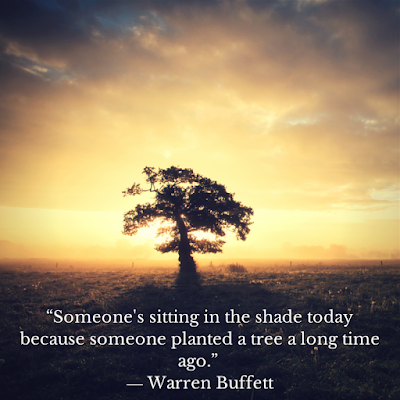Imagine yourself sitting under the Bodhi Tree at Bodh Gaya, the place where Gautama Buddha attained enlightenment after 49 days of rigorous meditation. After experiencing inner freedom, Gautama Buddha thanked the tree for giving him resilience and support during his struggle for enlightenment. This was in 3rd century BC.
Since then, Bodhi Tree has stood the test of time, although there are stories around people trying to cut and poison the tree. Also, there are stories that King Ashoka’s daughter planted original shoot in Srilanka and this tree still flourishes with no signs of ageing. This is a symbol of history blending into oneness, where time loses its identity and transcends into permanence in contrast to this dynamic and disruptive world.
There is of course a uniqueness to Bodhi Tree, the association with one of the greatest men that ever lived – Gautama Buddha. This is also one of the best example of Endurance.
It is important to understand what makes something survive and thrive for so long. And if we can draw out the parallels to companies for investing then it will be a true enlightenment as an investor – the path to permanence, resilience and endurance.
Last year, I came across interview of Anthony Deden – chairman of Edelweiss Holdings who focused on scarcity, permanence and independence as core pillars in his investment portfolio. The thoughts further inspired me to read through his letters to shareholders and they were eye-opener. I have tried to gather some learning and gathered my notes around the same in this blog.
Below is the video interview which I would highly recommend to watch.
Why this is important? Why should Capital preservation come first?
Capital represents our savings and lifetime work. To accumulate savings requires time, effort and sacrifice. We should have utmost respect for its irreplaceability. This triggers the quest to find place for the capital in partnering companies and owners that has permanence, endurance, independence and which is scarce.
Some of the qualities we should be looking at for investing in great businesses…
Customer-orientation and adaptive to change:
The primary focus of company should be on building great products and customer orientation and not profits. Walter Isaacson’s biography on Steve Jobs clearly demonstrates this trait.
“My passion has been to build an enduring company where people were motivated to make great products. Everything else was secondary. Sure, it was great to make a profit, because that was what allowed you to make great products. But the products, not the profits, were the motivation […] it’s a subtle difference, but it ends up meaning everything: the people you hire, who gets promoted, what you discuss in meetings.”
And this DNA of such companies is what make them scarce in the world where companies constantly chase profits. He understood that value is not merely in things one can measure. As such money should be byproduct of doing something extremely well – not the objective in first place.
He also understood what customer will need in future. That’s evolutionary thinking and vision which is required.

The People Crazy Enough to Think They Can Change the World Are the Ones Who Do…
Steve Jobs
This is beautifully explained by Walter in the same book through an anecdote.
“Some people say, “Give the customers what they want.” But that’s not my approach. Our job is to figure out what they are going to want before they do. I think Henry Ford once said, “If I’d asked customers what they wanted, they would have told me, ‘A faster horse!’” People don’t know what they want until you show it to them. That’s why I never rely on market research. Our task is to read things that are not yet on the page”
Understanding earnings power and thinking about what can go wrong:
In the letter published in July 2012, Tony Deden has referenced speech given by Sir Mark Webster Jenkinson on Earning Power of the business.
“To gauge the earning power of the business, it is essential to ascertain how the profits have been earned, where the profits have been earned and why the profits have been earned.”
The emphasis is his and the statement is profound in that it forces us to decide on whether the business is desirable before we set out to see what it is worth.

Notice that the how, where and why demand non-quantitative reflection. The task forces us to come to a judgment about all the things that can go wrong before we make assumptions about the future or attempt to assign a value to such holding. It forces us to make a judgment about the certainty of a stream of income and the permanence of its undertaking.
Avoiding risks and fragility, particularly from debt:
One of the factor around avoiding fragility to achieve endurance comes from conservative approach towards debt. Capital strength is one of the key ingredient of enduring businesses. This also gives independence of action and ability to bear pain in difficult times.
“Enduring businesses are customer-oriented and adaptive to change; have strong cohesion and sense of identity; display a powerful drive for progress; consider themselves stewards of a long standing enterprise—each generation being only a link in a long chain; are conservative in financing and frugal; they do not risk capital gratuitously; they associate debt with fragility and risk. Indeed, capital strength gives one options, flexibility and independence of action—not at the mercy of bankers and financiers. They believe that profitability is a mere symptom of health and not the cause; they have a low priority in maximizing shareholder wealth and they focus on capabilities, not mere competencies.”
– Speech to Shareholders, London (October 2015)
The financial activity and world obsessed with using future earnings for short term benefit by taking debt has created illusion of profits which is not sustainable most of the times. And worse it takes away independence of the company during bad times, often even leading to insolvency.
“Distinguishing between the productive and unproductive has become difficult since financial activity, often for its own sake, dominates the business landscape and has deluded folks into believing that debt creation is wealth creation and that the ultimate end is money in itself. To make matters worse, much of what passes for prices on a day to day basis is the product of untold and often covert suppression, manipulation and distortion. Meaningless prices beget meaningless conclusions.”
– Letters to Shareholders (January 2011)
Long term thinking of owner-operators and extreme focus:
It is important to have mindset of owners for those who are running the businesses and same goes with investor. People do things better when they are owners and when they love their business more than they love the pursuit of money.

By pursuing decision towards permanence, these owners can avoid large errors in judgment. Such companies eschew short-term results for the purpose of sowing seeds for another generation. Some other characteristics of these owners includes frugality in good or bad times, distaste for growth through acquisitions, aversion to debt, rates of reinvestment and ability to attract as well as retain talent.
They respect their minority shareholders, they have better and more meaningful relationships with their employees, suppliers and customers. They are focused on what they do. And they do it well.
Again, these are very rare characteristics and hence this makes such businesses scarce.
Similarly, as an investors when we think like owners, the aspects like survival and ability to endure become more important. The time preference automatically changes. We then are able to differentiate between value of the business and price of the business – the transition to permanence from what is momentary.
From an interview with Lane Wallace, “Original Sin on Wall Street,” The Atlantic, 19 Feb 2010:
“The price of the stock is a momentary, transitory thing that can be reversed in a moment, or washed away or greatly enhanced over the course of years and decades”
Conclusion:
In this chaotic, disruptive and world obsessed with short term results, an investor seeking capital protection having long term view about the investment process should think back and start quest for companies and owners with mindset as well as character of permanence, scarcity and independence..!! The quest is changing the focus from quantitative aspects to qualitative aspects. And when one gets that, it is a phase of enlightenment..!!
Just like Gautama Buddha achieved enlightenment under the Bodhi Tree…!!
Disclaimer: The article is for knowledge sharing purpose. This should not be considered as an investment advice in any manner. Please consult your financial adviser for any investing decisions.
References:
Edelweiss Journal: https://edelweissjournal.com/

It’s great
Really amazing and eye opener
The message by you in blog is in line with your reccomemded video The Strangest Secret By Earl Nightingale . The more the quantum of service towards the chosen goal,the more the returns. Efforts should be to achieve the goal , results will follow.